Guided Reading Worksheet: Globalization and African Mining
VerifiedAdded on 2021/04/21
|6
|1714
|72
Homework Assignment
AI Summary
This guided reading worksheet delves into the complexities of globalization and its impact on the African mining industry. It examines how multinational companies, primarily from North America, Europe, and Asia, are adapting their operations to the unique macroeconomic conditions of Africa. The worksheet analyzes various scholarly articles, focusing on the interplay between globalization and localization strategies. It explores the challenges, such as political instability, corruption, and cultural differences, that foreign companies face while investing in the African mining sector. The research uses secondary sources to examine the macroeconomic conditions and the integration of global operations with local market conditions. The findings highlight the importance of adapting to local conditions, generating employment, and contributing to economic development. The worksheet concludes by emphasizing the need for changes in the external market environment to attract further investment and drive economic growth within African nations. The goal is to improve reading skills and understanding of academic journal articles, preparing the student to write an in-class essay on the topic.
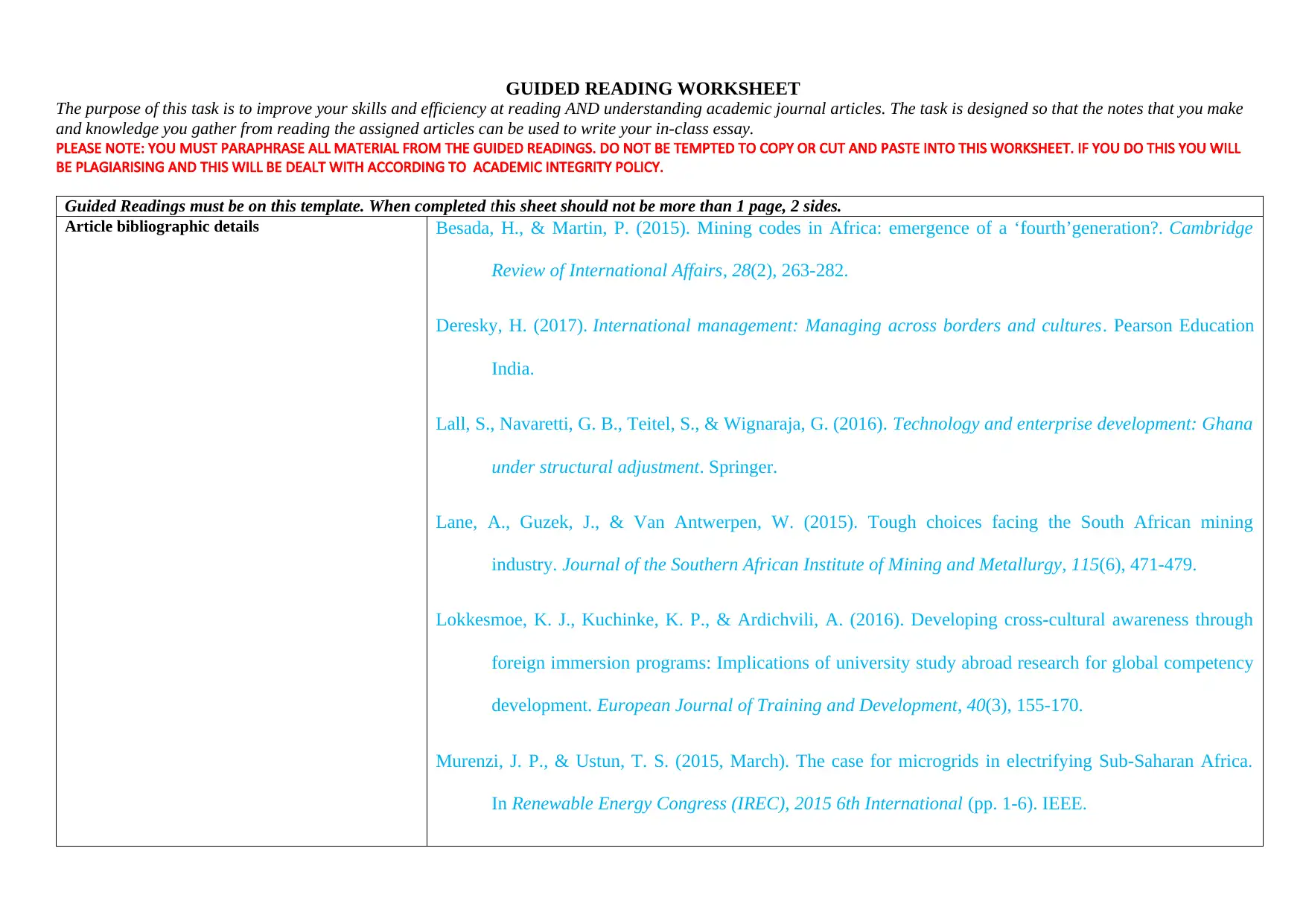
GUIDED READING WORKSHEET
The purpose of this task is to improve your skills and efficiency at reading AND understanding academic journal articles. The task is designed so that the notes that you make
and knowledge you gather from reading the assigned articles can be used to write your in-class essay.
PLEASE NOTE: YOU MUST PARAPHRASE ALL MATERIAL FROM THE GUIDED READINGS. DO NOT BE TEMPTED TO COPY OR CUT AND PASTE INTO THIS WORKSHEET. IF YOU DO THIS YOU WILL
BE PLAGIARISING AND THIS WILL BE DEALT WITH ACCORDING TO ACADEMIC INTEGRITY POLICY.
Guided Readings must be on this template. When completed this sheet should not be more than 1 page, 2 sides.
Article bibliographic details Besada, H., & Martin, P. (2015). Mining codes in Africa: emergence of a ‘fourth’generation?. Cambridge
Review of International Affairs, 28(2), 263-282.
Deresky, H. (2017). International management: Managing across borders and cultures. Pearson Education
India.
Lall, S., Navaretti, G. B., Teitel, S., & Wignaraja, G. (2016). Technology and enterprise development: Ghana
under structural adjustment. Springer.
Lane, A., Guzek, J., & Van Antwerpen, W. (2015). Tough choices facing the South African mining
industry. Journal of the Southern African Institute of Mining and Metallurgy, 115(6), 471-479.
Lokkesmoe, K. J., Kuchinke, K. P., & Ardichvili, A. (2016). Developing cross-cultural awareness through
foreign immersion programs: Implications of university study abroad research for global competency
development. European Journal of Training and Development, 40(3), 155-170.
Murenzi, J. P., & Ustun, T. S. (2015, March). The case for microgrids in electrifying Sub-Saharan Africa.
In Renewable Energy Congress (IREC), 2015 6th International (pp. 1-6). IEEE.
The purpose of this task is to improve your skills and efficiency at reading AND understanding academic journal articles. The task is designed so that the notes that you make
and knowledge you gather from reading the assigned articles can be used to write your in-class essay.
PLEASE NOTE: YOU MUST PARAPHRASE ALL MATERIAL FROM THE GUIDED READINGS. DO NOT BE TEMPTED TO COPY OR CUT AND PASTE INTO THIS WORKSHEET. IF YOU DO THIS YOU WILL
BE PLAGIARISING AND THIS WILL BE DEALT WITH ACCORDING TO ACADEMIC INTEGRITY POLICY.
Guided Readings must be on this template. When completed this sheet should not be more than 1 page, 2 sides.
Article bibliographic details Besada, H., & Martin, P. (2015). Mining codes in Africa: emergence of a ‘fourth’generation?. Cambridge
Review of International Affairs, 28(2), 263-282.
Deresky, H. (2017). International management: Managing across borders and cultures. Pearson Education
India.
Lall, S., Navaretti, G. B., Teitel, S., & Wignaraja, G. (2016). Technology and enterprise development: Ghana
under structural adjustment. Springer.
Lane, A., Guzek, J., & Van Antwerpen, W. (2015). Tough choices facing the South African mining
industry. Journal of the Southern African Institute of Mining and Metallurgy, 115(6), 471-479.
Lokkesmoe, K. J., Kuchinke, K. P., & Ardichvili, A. (2016). Developing cross-cultural awareness through
foreign immersion programs: Implications of university study abroad research for global competency
development. European Journal of Training and Development, 40(3), 155-170.
Murenzi, J. P., & Ustun, T. S. (2015, March). The case for microgrids in electrifying Sub-Saharan Africa.
In Renewable Energy Congress (IREC), 2015 6th International (pp. 1-6). IEEE.
Paraphrase This Document
Need a fresh take? Get an instant paraphrase of this document with our AI Paraphraser
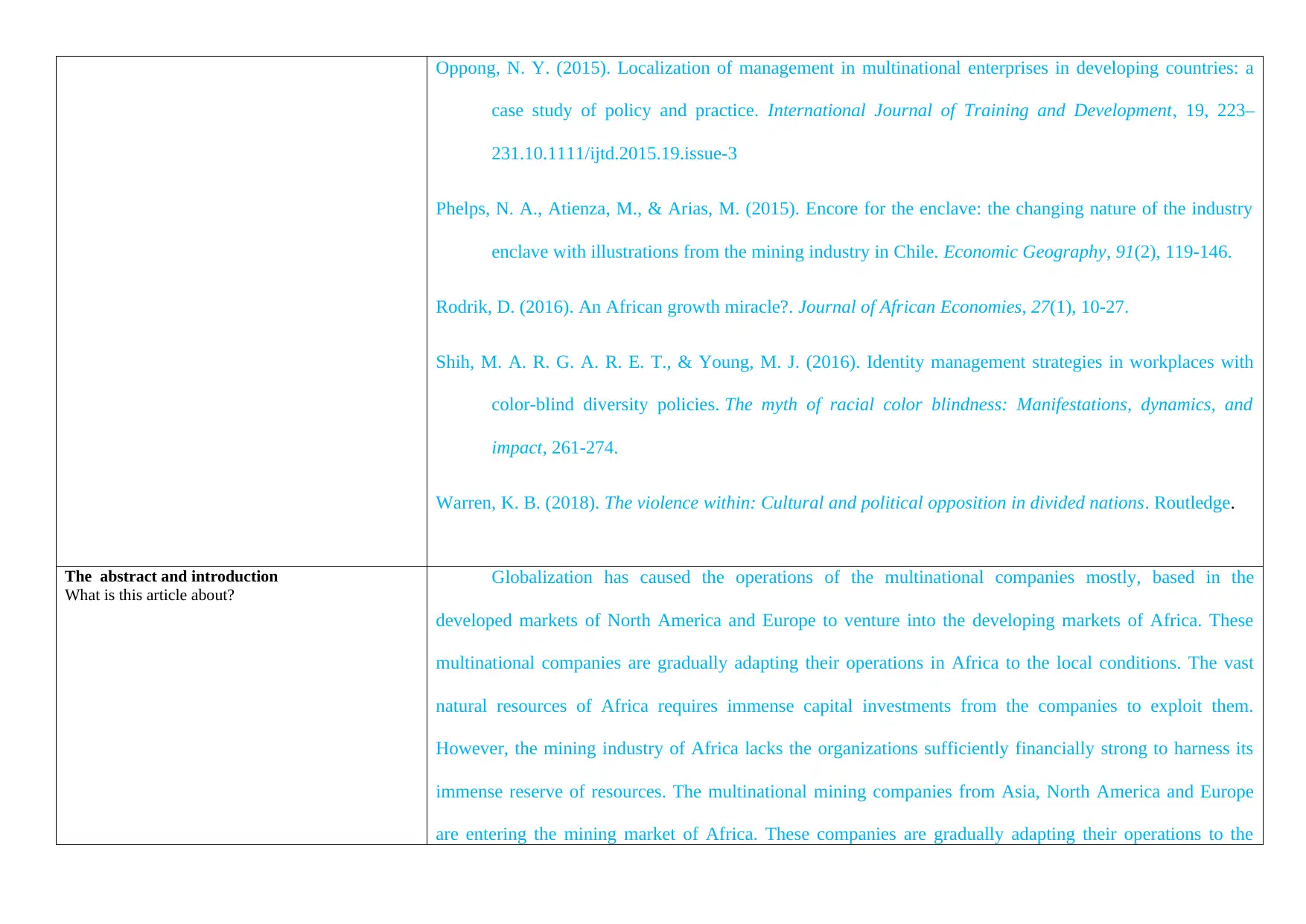
Oppong, N. Y. (2015). Localization of management in multinational enterprises in developing countries: a
case study of policy and practice. International Journal of Training and Development, 19, 223–
231.10.1111/ijtd.2015.19.issue-3
Phelps, N. A., Atienza, M., & Arias, M. (2015). Encore for the enclave: the changing nature of the industry
enclave with illustrations from the mining industry in Chile. Economic Geography, 91(2), 119-146.
Rodrik, D. (2016). An African growth miracle?. Journal of African Economies, 27(1), 10-27.
Shih, M. A. R. G. A. R. E. T., & Young, M. J. (2016). Identity management strategies in workplaces with
color-blind diversity policies. The myth of racial color blindness: Manifestations, dynamics, and
impact, 261-274.
Warren, K. B. (2018). The violence within: Cultural and political opposition in divided nations. Routledge.
The abstract and introduction
What is this article about?
Globalization has caused the operations of the multinational companies mostly, based in the
developed markets of North America and Europe to venture into the developing markets of Africa. These
multinational companies are gradually adapting their operations in Africa to the local conditions. The vast
natural resources of Africa requires immense capital investments from the companies to exploit them.
However, the mining industry of Africa lacks the organizations sufficiently financially strong to harness its
immense reserve of resources. The multinational mining companies from Asia, North America and Europe
are entering the mining market of Africa. These companies are gradually adapting their operations to the
case study of policy and practice. International Journal of Training and Development, 19, 223–
231.10.1111/ijtd.2015.19.issue-3
Phelps, N. A., Atienza, M., & Arias, M. (2015). Encore for the enclave: the changing nature of the industry
enclave with illustrations from the mining industry in Chile. Economic Geography, 91(2), 119-146.
Rodrik, D. (2016). An African growth miracle?. Journal of African Economies, 27(1), 10-27.
Shih, M. A. R. G. A. R. E. T., & Young, M. J. (2016). Identity management strategies in workplaces with
color-blind diversity policies. The myth of racial color blindness: Manifestations, dynamics, and
impact, 261-274.
Warren, K. B. (2018). The violence within: Cultural and political opposition in divided nations. Routledge.
The abstract and introduction
What is this article about?
Globalization has caused the operations of the multinational companies mostly, based in the
developed markets of North America and Europe to venture into the developing markets of Africa. These
multinational companies are gradually adapting their operations in Africa to the local conditions. The vast
natural resources of Africa requires immense capital investments from the companies to exploit them.
However, the mining industry of Africa lacks the organizations sufficiently financially strong to harness its
immense reserve of resources. The multinational mining companies from Asia, North America and Europe
are entering the mining market of Africa. These companies are gradually adapting their operations to the
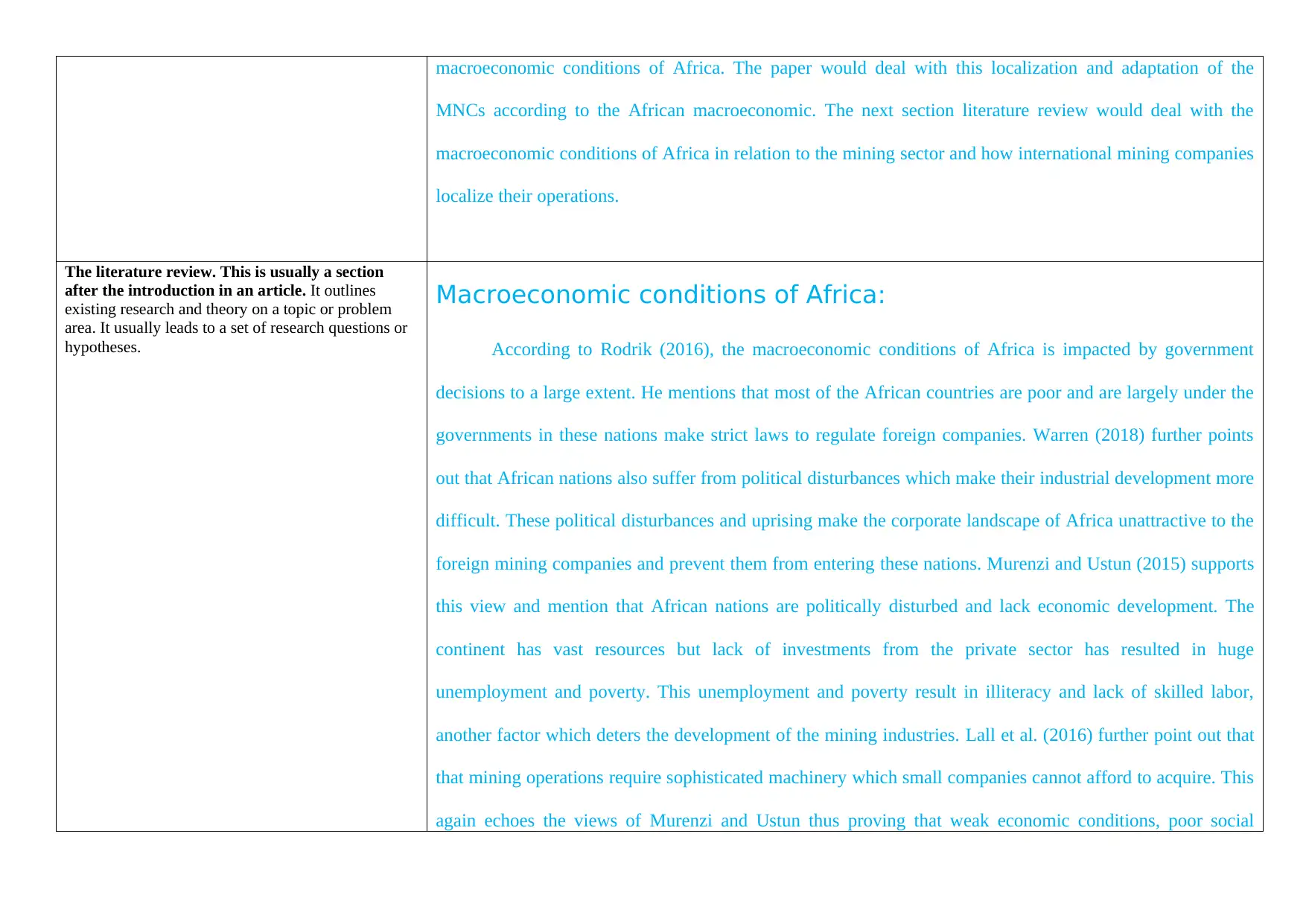
macroeconomic conditions of Africa. The paper would deal with this localization and adaptation of the
MNCs according to the African macroeconomic. The next section literature review would deal with the
macroeconomic conditions of Africa in relation to the mining sector and how international mining companies
localize their operations.
The literature review. This is usually a section
after the introduction in an article. It outlines
existing research and theory on a topic or problem
area. It usually leads to a set of research questions or
hypotheses.
Macroeconomic conditions of Africa:
According to Rodrik (2016), the macroeconomic conditions of Africa is impacted by government
decisions to a large extent. He mentions that most of the African countries are poor and are largely under the
governments in these nations make strict laws to regulate foreign companies. Warren (2018) further points
out that African nations also suffer from political disturbances which make their industrial development more
difficult. These political disturbances and uprising make the corporate landscape of Africa unattractive to the
foreign mining companies and prevent them from entering these nations. Murenzi and Ustun (2015) supports
this view and mention that African nations are politically disturbed and lack economic development. The
continent has vast resources but lack of investments from the private sector has resulted in huge
unemployment and poverty. This unemployment and poverty result in illiteracy and lack of skilled labor,
another factor which deters the development of the mining industries. Lall et al. (2016) further point out that
that mining operations require sophisticated machinery which small companies cannot afford to acquire. This
again echoes the views of Murenzi and Ustun thus proving that weak economic conditions, poor social
MNCs according to the African macroeconomic. The next section literature review would deal with the
macroeconomic conditions of Africa in relation to the mining sector and how international mining companies
localize their operations.
The literature review. This is usually a section
after the introduction in an article. It outlines
existing research and theory on a topic or problem
area. It usually leads to a set of research questions or
hypotheses.
Macroeconomic conditions of Africa:
According to Rodrik (2016), the macroeconomic conditions of Africa is impacted by government
decisions to a large extent. He mentions that most of the African countries are poor and are largely under the
governments in these nations make strict laws to regulate foreign companies. Warren (2018) further points
out that African nations also suffer from political disturbances which make their industrial development more
difficult. These political disturbances and uprising make the corporate landscape of Africa unattractive to the
foreign mining companies and prevent them from entering these nations. Murenzi and Ustun (2015) supports
this view and mention that African nations are politically disturbed and lack economic development. The
continent has vast resources but lack of investments from the private sector has resulted in huge
unemployment and poverty. This unemployment and poverty result in illiteracy and lack of skilled labor,
another factor which deters the development of the mining industries. Lall et al. (2016) further point out that
that mining operations require sophisticated machinery which small companies cannot afford to acquire. This
again echoes the views of Murenzi and Ustun thus proving that weak economic conditions, poor social
⊘ This is a preview!⊘
Do you want full access?
Subscribe today to unlock all pages.

Trusted by 1+ million students worldwide
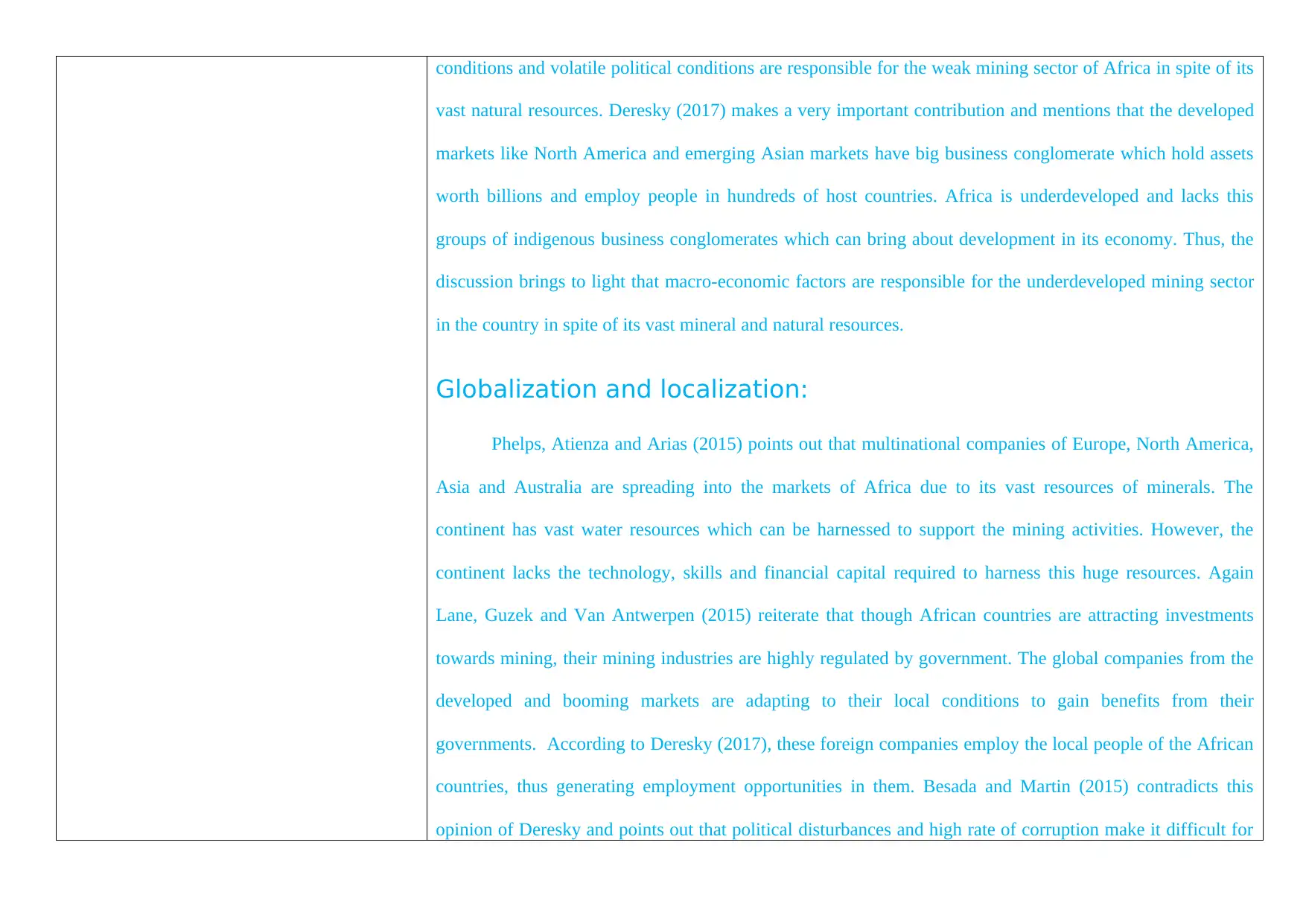
conditions and volatile political conditions are responsible for the weak mining sector of Africa in spite of its
vast natural resources. Deresky (2017) makes a very important contribution and mentions that the developed
markets like North America and emerging Asian markets have big business conglomerate which hold assets
worth billions and employ people in hundreds of host countries. Africa is underdeveloped and lacks this
groups of indigenous business conglomerates which can bring about development in its economy. Thus, the
discussion brings to light that macro-economic factors are responsible for the underdeveloped mining sector
in the country in spite of its vast mineral and natural resources.
Globalization and localization:
Phelps, Atienza and Arias (2015) points out that multinational companies of Europe, North America,
Asia and Australia are spreading into the markets of Africa due to its vast resources of minerals. The
continent has vast water resources which can be harnessed to support the mining activities. However, the
continent lacks the technology, skills and financial capital required to harness this huge resources. Again
Lane, Guzek and Van Antwerpen (2015) reiterate that though African countries are attracting investments
towards mining, their mining industries are highly regulated by government. The global companies from the
developed and booming markets are adapting to their local conditions to gain benefits from their
governments. According to Deresky (2017), these foreign companies employ the local people of the African
countries, thus generating employment opportunities in them. Besada and Martin (2015) contradicts this
opinion of Deresky and points out that political disturbances and high rate of corruption make it difficult for
vast natural resources. Deresky (2017) makes a very important contribution and mentions that the developed
markets like North America and emerging Asian markets have big business conglomerate which hold assets
worth billions and employ people in hundreds of host countries. Africa is underdeveloped and lacks this
groups of indigenous business conglomerates which can bring about development in its economy. Thus, the
discussion brings to light that macro-economic factors are responsible for the underdeveloped mining sector
in the country in spite of its vast mineral and natural resources.
Globalization and localization:
Phelps, Atienza and Arias (2015) points out that multinational companies of Europe, North America,
Asia and Australia are spreading into the markets of Africa due to its vast resources of minerals. The
continent has vast water resources which can be harnessed to support the mining activities. However, the
continent lacks the technology, skills and financial capital required to harness this huge resources. Again
Lane, Guzek and Van Antwerpen (2015) reiterate that though African countries are attracting investments
towards mining, their mining industries are highly regulated by government. The global companies from the
developed and booming markets are adapting to their local conditions to gain benefits from their
governments. According to Deresky (2017), these foreign companies employ the local people of the African
countries, thus generating employment opportunities in them. Besada and Martin (2015) contradicts this
opinion of Deresky and points out that political disturbances and high rate of corruption make it difficult for
Paraphrase This Document
Need a fresh take? Get an instant paraphrase of this document with our AI Paraphraser
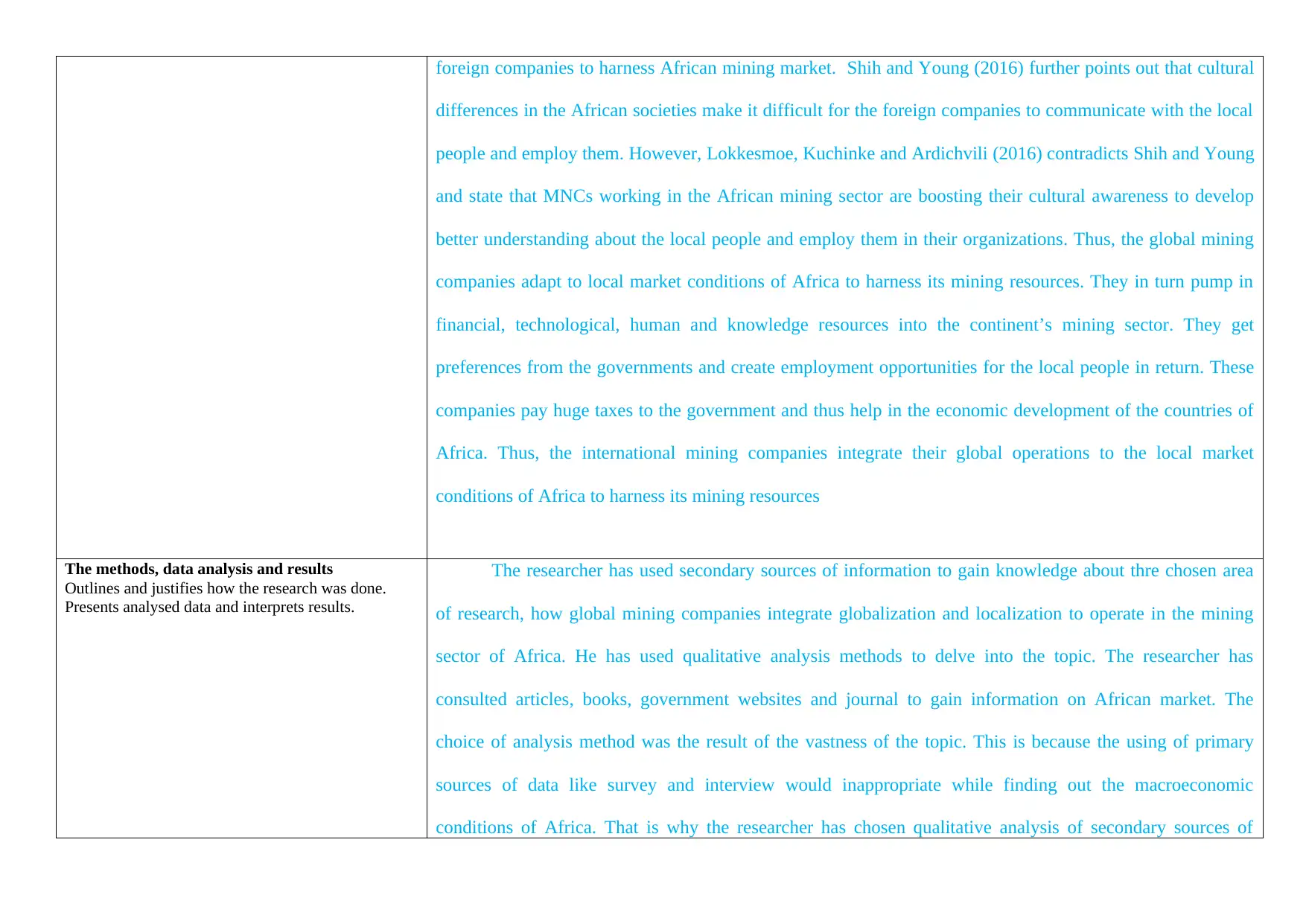
foreign companies to harness African mining market. Shih and Young (2016) further points out that cultural
differences in the African societies make it difficult for the foreign companies to communicate with the local
people and employ them. However, Lokkesmoe, Kuchinke and Ardichvili (2016) contradicts Shih and Young
and state that MNCs working in the African mining sector are boosting their cultural awareness to develop
better understanding about the local people and employ them in their organizations. Thus, the global mining
companies adapt to local market conditions of Africa to harness its mining resources. They in turn pump in
financial, technological, human and knowledge resources into the continent’s mining sector. They get
preferences from the governments and create employment opportunities for the local people in return. These
companies pay huge taxes to the government and thus help in the economic development of the countries of
Africa. Thus, the international mining companies integrate their global operations to the local market
conditions of Africa to harness its mining resources
The methods, data analysis and results
Outlines and justifies how the research was done.
Presents analysed data and interprets results.
The researcher has used secondary sources of information to gain knowledge about thre chosen area
of research, how global mining companies integrate globalization and localization to operate in the mining
sector of Africa. He has used qualitative analysis methods to delve into the topic. The researcher has
consulted articles, books, government websites and journal to gain information on African market. The
choice of analysis method was the result of the vastness of the topic. This is because the using of primary
sources of data like survey and interview would inappropriate while finding out the macroeconomic
conditions of Africa. That is why the researcher has chosen qualitative analysis of secondary sources of
differences in the African societies make it difficult for the foreign companies to communicate with the local
people and employ them. However, Lokkesmoe, Kuchinke and Ardichvili (2016) contradicts Shih and Young
and state that MNCs working in the African mining sector are boosting their cultural awareness to develop
better understanding about the local people and employ them in their organizations. Thus, the global mining
companies adapt to local market conditions of Africa to harness its mining resources. They in turn pump in
financial, technological, human and knowledge resources into the continent’s mining sector. They get
preferences from the governments and create employment opportunities for the local people in return. These
companies pay huge taxes to the government and thus help in the economic development of the countries of
Africa. Thus, the international mining companies integrate their global operations to the local market
conditions of Africa to harness its mining resources
The methods, data analysis and results
Outlines and justifies how the research was done.
Presents analysed data and interprets results.
The researcher has used secondary sources of information to gain knowledge about thre chosen area
of research, how global mining companies integrate globalization and localization to operate in the mining
sector of Africa. He has used qualitative analysis methods to delve into the topic. The researcher has
consulted articles, books, government websites and journal to gain information on African market. The
choice of analysis method was the result of the vastness of the topic. This is because the using of primary
sources of data like survey and interview would inappropriate while finding out the macroeconomic
conditions of Africa. That is why the researcher has chosen qualitative analysis of secondary sources of
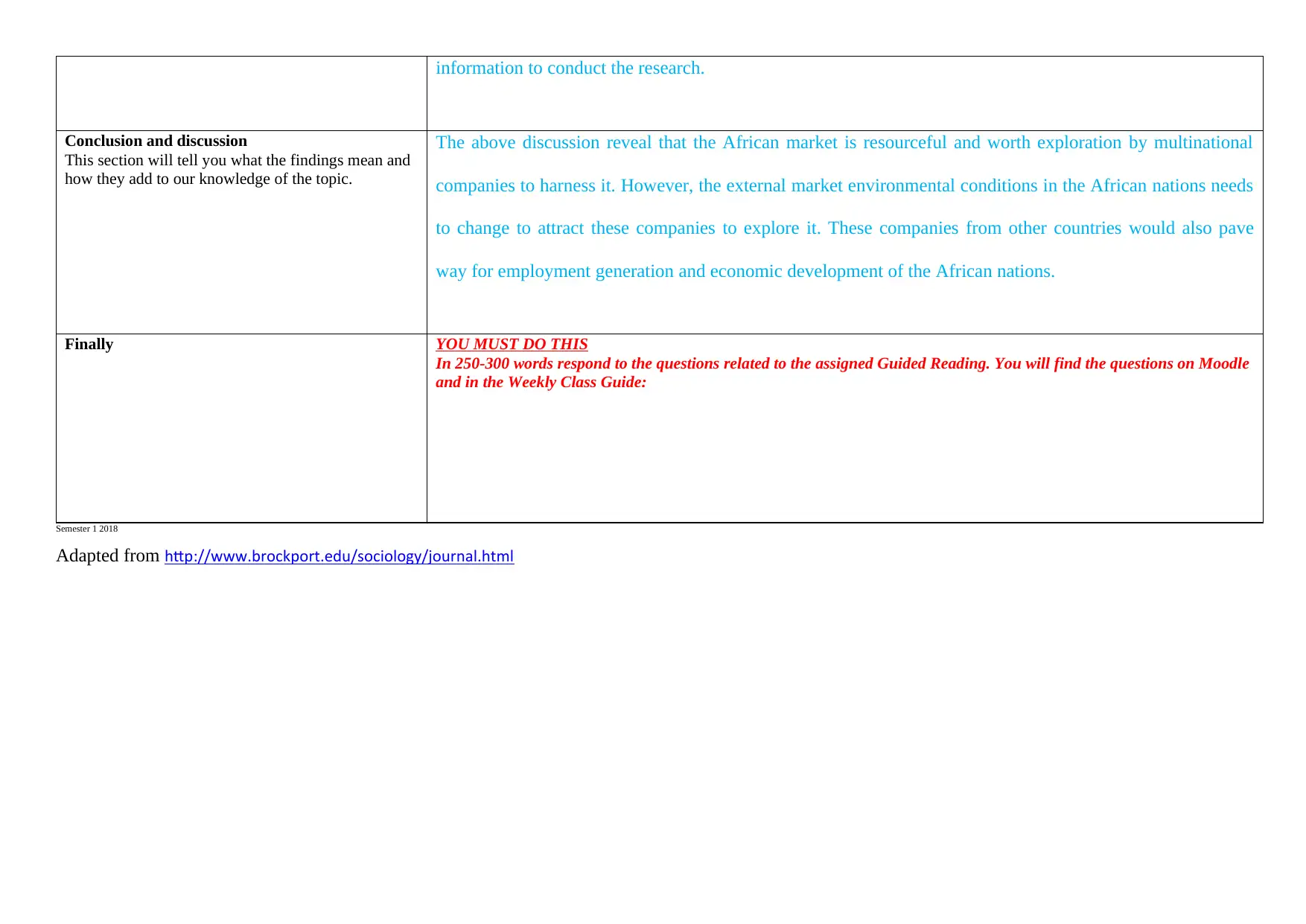
information to conduct the research.
Conclusion and discussion
This section will tell you what the findings mean and
how they add to our knowledge of the topic.
The above discussion reveal that the African market is resourceful and worth exploration by multinational
companies to harness it. However, the external market environmental conditions in the African nations needs
to change to attract these companies to explore it. These companies from other countries would also pave
way for employment generation and economic development of the African nations.
Finally YOU MUST DO THIS
In 250-300 words respond to the questions related to the assigned Guided Reading. You will find the questions on Moodle
and in the Weekly Class Guide:
Semester 1 2018
Adapted from http://www.brockport.edu/sociology/journal.html
Conclusion and discussion
This section will tell you what the findings mean and
how they add to our knowledge of the topic.
The above discussion reveal that the African market is resourceful and worth exploration by multinational
companies to harness it. However, the external market environmental conditions in the African nations needs
to change to attract these companies to explore it. These companies from other countries would also pave
way for employment generation and economic development of the African nations.
Finally YOU MUST DO THIS
In 250-300 words respond to the questions related to the assigned Guided Reading. You will find the questions on Moodle
and in the Weekly Class Guide:
Semester 1 2018
Adapted from http://www.brockport.edu/sociology/journal.html
⊘ This is a preview!⊘
Do you want full access?
Subscribe today to unlock all pages.

Trusted by 1+ million students worldwide
1 out of 6
Related Documents
Your All-in-One AI-Powered Toolkit for Academic Success.
+13062052269
info@desklib.com
Available 24*7 on WhatsApp / Email
![[object Object]](/_next/static/media/star-bottom.7253800d.svg)
Unlock your academic potential
Copyright © 2020–2026 A2Z Services. All Rights Reserved. Developed and managed by ZUCOL.



